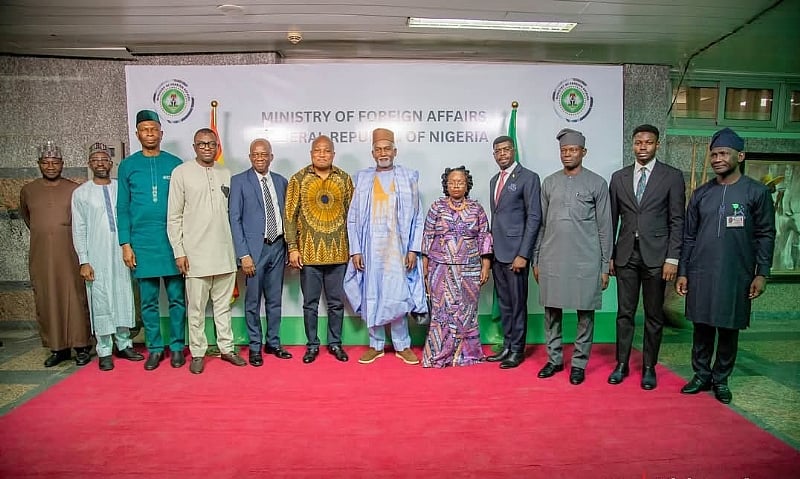Ghanaian Foreign Minister Samuel Okudzeto Ablakwa’s three-day working visit to Nigeria marked a significant step in reinforcing the robust bilateral relationship between the two West African nations. The visit, centered around discussions with Nigerian Foreign Minister Yusuf Maitama Tuggar, focused on strengthening regional cooperation, addressing critical security concerns, and advancing shared economic interests within the broader context of West African integration and development. This diplomatic engagement builds upon recent high-level interactions between the two countries, including President John Dramani Mahama’s diplomatic missions to Mali, Niger, and Burkina Faso, and his subsequent discussions with Nigerian President Bola Ahmed Tinubu. These ongoing dialogues reflect a shared commitment to regional stability and collaborative problem-solving in the face of evolving geopolitical challenges.
A primary focus of the ministerial discussions revolved around the escalating tensions within the Alliance of Sahel States (AES) and the broader implications for the Economic Community of West African States (ECOWAS). The Sahel region, facing a complex interplay of political instability, security threats, and humanitarian crises, requires a concerted and coordinated regional approach. Both Ghana and Nigeria, as influential members of ECOWAS, recognize the imperative for collaborative action to address these interconnected challenges and prevent further destabilization within the region. The ministers likely explored strategies for diplomatic engagement, conflict resolution, and humanitarian assistance to mitigate the ongoing crises and promote sustainable peace and security in the Sahel.
Beyond security concerns, the ministers dedicated significant attention to bolstering economic ties and fostering sustainable development within the framework of the African Continental Free Trade Area (AfCFTA). They discussed ways to enhance trade relations, stimulate job creation, and unlock the full potential of the AfCFTA for both nations. The ministers also reviewed progress on key Pan-African infrastructure projects, highlighting the strategic importance of initiatives such as the African Atlantic Gas Pipeline Project and the Abidjan-Lagos Corridor Highway. These transformative projects aim to enhance regional connectivity, facilitate trade and transportation, and stimulate economic growth across West Africa, contributing to greater regional integration and shared prosperity.
The upcoming 50th-anniversary celebration of ECOWAS also featured prominently in the discussions. The commemoration, set to be launched in Accra later this month under the leadership of President Mahama, presents an opportunity to reflect on the achievements of the regional bloc, reaffirm its commitment to integration, and chart a course for future collaboration. The ministers reviewed the preparations for this significant milestone, emphasizing the importance of showcasing the progress made in fostering regional unity, economic cooperation, and peace and security over the past five decades. The anniversary serves as a platform to renew the collective commitment to addressing the challenges and opportunities that lie ahead for West Africa.
Mr. Ablakwa’s visit underscores the deep and long-standing relationship between Ghana and Nigeria, characterized by mutual respect, shared interests, and a commitment to collaborative engagement on regional issues. The two countries, as major players in West Africa, recognize the importance of working together to address shared challenges and advance common goals. This visit reaffirms their commitment to continued dialogue and cooperation on a range of issues, from security and economic development to regional integration and diplomatic initiatives. It signifies a shared vision for a more stable, prosperous, and integrated West Africa.
The discussions held during this visit are expected to pave the way for enhanced bilateral cooperation and contribute to broader regional stability and development. The focus on addressing the Sahel crisis, promoting intra-African trade, and advancing strategic infrastructure projects demonstrates a shared commitment to tackling critical challenges and unlocking the region’s vast potential. Furthermore, the collaborative approach to the ECOWAS 50th-anniversary celebrations underscores the importance of regional unity and collective action in shaping a positive future for West Africa. The visit represents a significant step in solidifying the Ghana-Nigeria partnership and strengthening their joint efforts towards a more secure and prosperous region.


